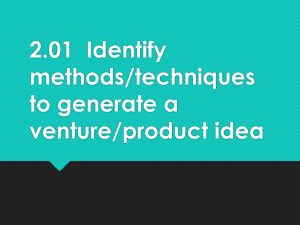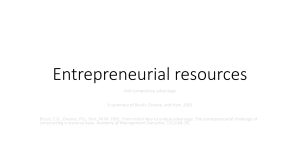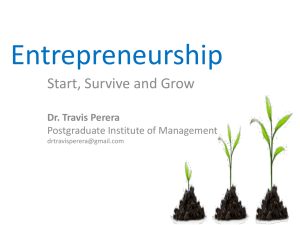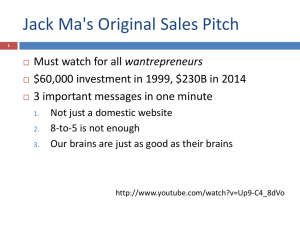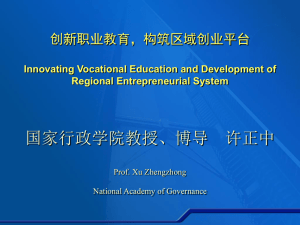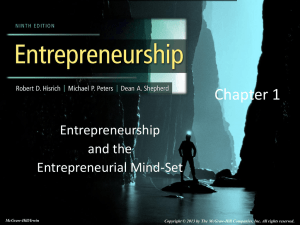click here.
advertisement
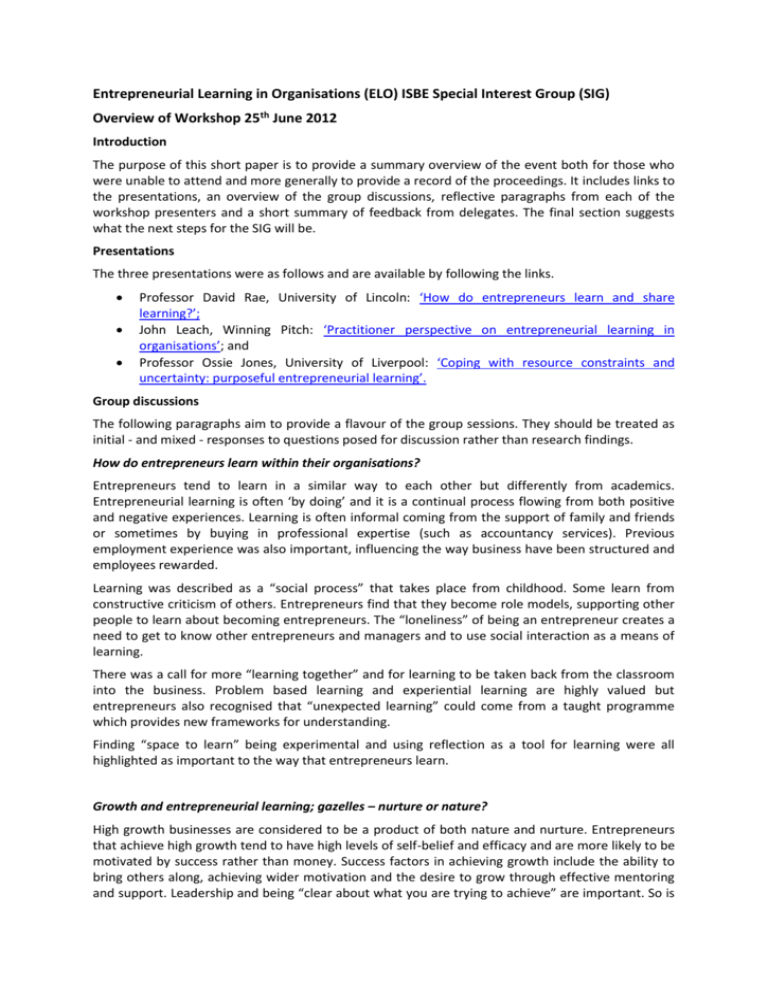
Entrepreneurial Learning in Organisations (ELO) ISBE Special Interest Group (SIG) Overview of Workshop 25th June 2012 Introduction The purpose of this short paper is to provide a summary overview of the event both for those who were unable to attend and more generally to provide a record of the proceedings. It includes links to the presentations, an overview of the group discussions, reflective paragraphs from each of the workshop presenters and a short summary of feedback from delegates. The final section suggests what the next steps for the SIG will be. Presentations The three presentations were as follows and are available by following the links. Professor David Rae, University of Lincoln: ‘How do entrepreneurs learn and share learning?’; John Leach, Winning Pitch: ‘Practitioner perspective on entrepreneurial learning in organisations’; and Professor Ossie Jones, University of Liverpool: ‘Coping with resource constraints and uncertainty: purposeful entrepreneurial learning’. Group discussions The following paragraphs aim to provide a flavour of the group sessions. They should be treated as initial - and mixed - responses to questions posed for discussion rather than research findings. How do entrepreneurs learn within their organisations? Entrepreneurs tend to learn in a similar way to each other but differently from academics. Entrepreneurial learning is often ‘by doing’ and it is a continual process flowing from both positive and negative experiences. Learning is often informal coming from the support of family and friends or sometimes by buying in professional expertise (such as accountancy services). Previous employment experience was also important, influencing the way business have been structured and employees rewarded. Learning was described as a “social process” that takes place from childhood. Some learn from constructive criticism of others. Entrepreneurs find that they become role models, supporting other people to learn about becoming entrepreneurs. The “loneliness” of being an entrepreneur creates a need to get to know other entrepreneurs and managers and to use social interaction as a means of learning. There was a call for more “learning together” and for learning to be taken back from the classroom into the business. Problem based learning and experiential learning are highly valued but entrepreneurs also recognised that “unexpected learning” could come from a taught programme which provides new frameworks for understanding. Finding “space to learn” being experimental and using reflection as a tool for learning were all highlighted as important to the way that entrepreneurs learn. Growth and entrepreneurial learning; gazelles – nurture or nature? High growth businesses are considered to be a product of both nature and nurture. Entrepreneurs that achieve high growth tend to have high levels of self-belief and efficacy and are more likely to be motivated by success rather than money. Success factors in achieving growth include the ability to bring others along, achieving wider motivation and the desire to grow through effective mentoring and support. Leadership and being “clear about what you are trying to achieve” are important. So is the development of teams and the culture of the organisation. For people aiming to achieve high growth businesses there is a need to “take the lid off limiting beliefs” and to develop more appropriate inner scripts such as “who should I be”? How can business owners and other managers encourage entrepreneurial learning within their organisations? Willingness to learn and change starts with the entrepreneur. One academic perspective was that businesses are reluctant to get involved with formal training due to the conflict between time and value. Participating entrepreneurs themselves felt this was not the case and that there is, among, business leaders a willingness to listen to new ideas and to be challenged. Training does, however need to be linked to projects in the firm. The value of reflective learning, and peer learning involving social interaction was thought to be particularly effective and it was observed that a significant drawback of online training is that there is no social interaction with others on the programme. Improving the potential for wider learning within organisations may be achieved by working to increase the capacity of individuals, improving communication within organisations and by encouraging entrepreneurial learning both from the top down and the bottom up. It may be possible to increase entrepreneurial learning by recruiting people with an entrepreneurial mindset. Barriers to learning were identified as power, stagnant practice, people being uncomfortable with change, conflict and lack of confidence. In addition, those working to support entrepreneurial learning should avoid “polysyllabic gobbledy-de-gook” and understand that “actionable information” is needed. How does – and should – government policy encourage entrepreneurial learning for SME development? Education for businesses tends to be assessment and grade driven. It is not about problem solving and dealing with ambiguity. We need to make effective use of existing knowledge and skills by encouraging learning through social interaction. Learning networks have a role to play in this respect. The gaps should be plugged with skills brought in when needed. There is a need to build different programs at different levels and importantly to ask people what they want. More broadly there is a question about how government should support growth and aspirations to grow: “tax breaks are not enough”. Presenter reflections Professor David Rae, University of Lincoln The Entrepreneurial Learning SIG launch event brought together a vibrant group of educators, entrepreneurs, researchers and others, demonstrating the capacity of the SIG to create new connections and to share understanding and knowledge between education and practice. Given the gloomy economic context, this group and the meeting could not be more timely. The event showed that Entrepreneurial Learning is central to enabling business people, aspiring entrepreneurs of all ages, and Universities to generate the culture, capabilities and commitment for entrepreneurship. Business practice happens faster than academic research and teaching, but academic work can support and enable entrepreneurs. John Leach, Winning Pitch This was an extremely thought provoking session. As a keen observer of entrepreneurial learning and improvement my view is that the UK economy will grow faster if more effective leaders are created and nurtured. Greater emphasis needs to be given to helping shape bigger thinking and greater ambition. I feel that academic enterprise research in the future should investigate in greater depth the emotional needs of entrepreneurs – the spirit and mindset. Setting up and growing a business can be extremely demanding for an individual. Balancing personal and commercial risk can be a very debilitating experience, so we should look at developing more practical coping strategies that help to overcome the fear often associated with the stages of growth. From my discussions with participants I felt greater research emphasis is being placed on softer issues. I personally feel that topics such as developing an entrepreneurial mindset, coping, resilience, mental toughness, personal branding and faith need to be on the agenda. Practical tools to help entrepreneurs address these areas would be well received within the community - when the going gets tough, the tough get going. Being an entrepreneur can be a lonely rollercoaster existence, helping to live with dark moments would be a well-received antidote for individuals wanting to make a difference. I am extremely excited about the work ISBE is undertaking. Professor Ossie Jones, University of Liverpool The inaugural meeting of the ISBE Special Interest Group on Entrepreneurial Learning at MMUBS brought together academics, doctoral students and entrepreneurs. I thought that the event was a tremendous success because it encouraged a genuine interchange of ideas and knowledge between the academic and practitioner communities. It provided opportunities for open discussion about the difficulties of real entrepreneurial learning taking place while owner-managers have to deal with the immediate problems of ensuring that their businesses survive and prosper. Recent research demonstrates that entrepreneurial learning requires the time to reflect on success and failure as well as using other stakeholders (including family staff and professional advisors) as ‘sounding boards’ for new approaches. Such an approach can be described as expanding the ‘solution space’ for entrepreneurs by developing a wider range of capabilities within the business. The event demonstrated that practitioners and academics can engage in real debate that benefits both the practice of managing small firms and the academic study of entrepreneurial learning. Delegate feedback There was also plenty of feedback though the post event survey and overall it was very positive. Delegates liked the new business school and generally enjoyed the event very much. Many particularly welcomed the opportunity to network and share ideas between business and academia. There are, however, some things to refine for future events such as getting the format right and making sure there is time for everything on the agenda. This first workshop intended to encourage discussion on a wide range of topics as well as helping people get to know each other. Future meetings will be more focussed and delegates suggested a number of potential themes: Growth, internationalisation and policy; Capturing entrepreneurial learning; Interventions to enhance entrepreneurial learning in organisations; Knowledge transfer between academia and businesses; Opportunities for collaboration; Social and ethical enterprise; Marketing of entrepreneurship; and Lifestyle businesses. One more general comment was that there should perhaps be greater focus on entrepreneurial teams rather than lead entrepreneurs. Next steps Following this event, there has been considerable interest in expanding the SIG to include further regional workshops (Scotland, England Wales, Northern Ireland and London) with different themes and there is potential for a larger annual or biennial event drawing these groups together. There is specific interest in a Glasgow based workshop to be hosted by the Adam Smith Business School (University of Glasgow), the themes being growth and internationalisation and policy aspects. The intention is to maintain the mix of academics, business leaders and practitioners and it may be possible to link the thematic events to special issue journal publications. In the short term ISBE and CFE will circulate news to all those on the delegate list for the first workshop. On September 25th, MMU will host a research and practice workshop on small business growth. Please contact Lynn on l.martin@mmu.ac.uk for details.
